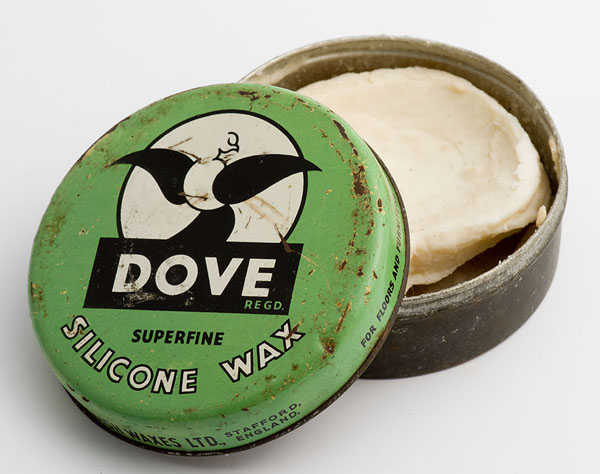English Waxes Ltd

Spic and Span Shoe Polishes Ltd was established in Glover Street, Stafford, on 3 June 1932 to supply shoe polishes to its part-owners, Lotus Limited, the shoe manufacturers. The company was formed by Adolph Axelrath, owner of the Yankee Polish Company in Germany. The lower section on the right of the photo above was used between 1932 to 1938, the remainder of the building to the left was used from 1938 to 1954.
In 1938 Dr Hermann Simon joined the company as director and chief chemist. As a German Jew in Nazi Germany, his career in the German chemical industry was cut short by the threat of war in the 1930s and before the war started he and his family emigrated to Britain. Under his direction, the company began to manufacture adhesives and sealant for the building trade, and in 1938 the company was renamed Spic and Span Chemical Products Limited. In October the same year, the name was changed again to Dove Chemical Products Limited because the Dove brand of polish was the company’s best-known product. However, the name infringed the trademark rights of another company, so in February 1940 the name was alphabetically reversed to become Evode Chemical Works Limited.
 During the Second World War Dr Simon, as a German National, was interned as an ‘enemy alien’. The factory was forced to move to a derelict shoe factory at 22 Stone Road (still extant, pictured left). Because of the loss to Britain’s war effort of his expertise in concrete and building technology (including the manufacture of airfield runways, water storage facilities and gas-proof stores) a plea was submitted to the House of Lords in August 1940. Dr Simon was released after nine months internship at Huyton and Peel, Isle of Man, camps and he returned to Evode to supply the government with sealants, paints and waterproofing compounds to aid the war effort and the company moved back to the Glover St premises after the war.
During the Second World War Dr Simon, as a German National, was interned as an ‘enemy alien’. The factory was forced to move to a derelict shoe factory at 22 Stone Road (still extant, pictured left). Because of the loss to Britain’s war effort of his expertise in concrete and building technology (including the manufacture of airfield runways, water storage facilities and gas-proof stores) a plea was submitted to the House of Lords in August 1940. Dr Simon was released after nine months internship at Huyton and Peel, Isle of Man, camps and he returned to Evode to supply the government with sealants, paints and waterproofing compounds to aid the war effort and the company moved back to the Glover St premises after the war.
English Waxes Ltd incorporated in 1948 and was a wholly-owned subsidiary of Evode. It went into voluntary liquidation in 1959 but was immediately incorporated again as a new company with the same name. The “Dove” polish business was sold to the Kiwi Polish Co Proprietary in 1962 and the remainder of the company was disposed of in 1971.

Photo: David Pratt
This large 11cm diameter, 45mm deep butterfly twist-off lid tin was made prior to 1971.
In 1948 Evo-stik was registered as an adhesive brand name and in 1949 the company name was shortened to Evode Ltd. In 1950 land in Common Road was acquired on the site of a former brickworks and production moved here in 1952/54. In 1952 the laboratory at the Glover Street premises suffered a fire. Vik Supplies Ltd factory (a company acquired 1956 and sold 1991) was still situated in Sandon Road but a major fire at the premises in 1962 resulted in a new factory being built on the Common Road site.
 Evode Ltd became Evode plc on 30th January 1963 when it was ‘floated’ on the London Stock Exchange. In 1993 the company was acquired by Laporte to form Laporte Adhesives and Sealants, encompassing the Evo-Stik and Sovereign brand names. In 1996 L.A.S. were taken over by Elf Atochem who had Ceca Adhesives with a Franco-European presence. Finally, in 2001 another round of takeovers – Bostick was formed originally in 1890 as the Boston Blacking Company and became involved in shoe adhesives. Bostick and then was taken over in 1929 by United Shoe Machinery. In 1990 Bostik was purchased by TOTAL, the French oil company. In another timeline the 1911 Wisconsin Paste Company (becoming Findley Adhesives in 1917) were bought by Elf Atochem in 1996 to form Ato Findley. In 2001, as a result of the merger of France’s largest oil & gas Companies Total Fina and Elf Aquitaine, the Elf Atochem, Laporte, Findley Adhesives, Ato Findley and Bostick companies were brought together to become Bostick Findley. Bostick Findley were renamed at Bostick in 2004.
Evode Ltd became Evode plc on 30th January 1963 when it was ‘floated’ on the London Stock Exchange. In 1993 the company was acquired by Laporte to form Laporte Adhesives and Sealants, encompassing the Evo-Stik and Sovereign brand names. In 1996 L.A.S. were taken over by Elf Atochem who had Ceca Adhesives with a Franco-European presence. Finally, in 2001 another round of takeovers – Bostick was formed originally in 1890 as the Boston Blacking Company and became involved in shoe adhesives. Bostick and then was taken over in 1929 by United Shoe Machinery. In 1990 Bostik was purchased by TOTAL, the French oil company. In another timeline the 1911 Wisconsin Paste Company (becoming Findley Adhesives in 1917) were bought by Elf Atochem in 1996 to form Ato Findley. In 2001, as a result of the merger of France’s largest oil & gas Companies Total Fina and Elf Aquitaine, the Elf Atochem, Laporte, Findley Adhesives, Ato Findley and Bostick companies were brought together to become Bostick Findley. Bostick Findley were renamed at Bostick in 2004.

The Commons Road, Stafford, site for Bostick/Evo-Stick is still very much in use today.
